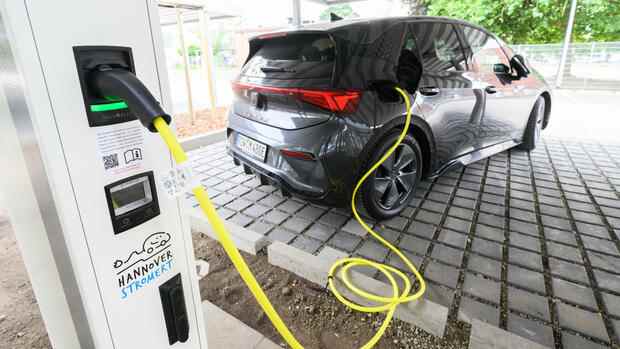Dusseldorf In July, the registrations of purely electric cars in Germany again increased disproportionately. The Federal Motor Transport Authority (KBA) published the figures for the past month on Wednesday. Accordingly, 13.2 percent more battery-powered vehicles were registered in July compared to the previous year. In the same period, registrations of cars with petrol engines fell by more than 20 percent. In the case of diesel-powered vehicles, it was over eleven percent less.
Even if, according to the KBA, registrations in July are 13 percent below the previous year, the strong demand for electric cars is good news for the automotive industry. Manufacturers and suppliers are investing billions in setting up production facilities for electric cars.
The order books are full, confirmed the auto parts supplier ZF when presenting its half-year figures on Wednesday. An order volume for electrified drives of a full 23 billion euros up to the year 2030 is slumbering in the books of the foundation group. The faster the demand increases, the more likely it is that the investments will pay off.
In any case, the expected reduction in purchase premiums on electric cars will not stop demand and the transformation of the industry. On the contrary: car manufacturers are currently unable to adequately meet demand, especially in Europe.
Top jobs of the day
Find the best jobs now and
be notified by email.
This is shown by a study by the strategy consultancy PwC. According to this, the car industry in Europe is expected to be able to produce 1.5 million electric cars this year. “With maximum capacity and without bottlenecks, there could be more than twice as many,” says Felix Kühnert, Partner at PwC.
This also coincides with the order situation at German car manufacturers. For example, BMW underestimated the demand for the i4 electric sedan. Instead of the 120,000 units produced annually in the medium term, which BMW had planned in advance, the car manufacturer could put almost twice as many i4s on the road, according to Manfred Schoch, head of the works council. Since December of last year, BMW has introduced extra shifts for the production of the model at its plant in Munich.
Mercedes boss Ola Källenius, in turn, asks his customers to be patient. The carmaker is already producing as quickly as possible to work off the backlog of orders, said Källenius when presenting the quarterly figures last week. The waiting times are also long for other manufacturers. Depending on the electric model, it can currently take up to 18 months between ordering and delivering a vehicle.
>> Read here: Record order for e-drives: automotive supplier ZF “more than compensates” for the elimination of the combustion engine
Customers have to wait a long time, especially for electric vehicles in the medium price segment. For example, it takes almost two years before a Skoda Enyaq reaches the customer. The reason: In times of material shortages, car manufacturers prioritize the production of expensive vehicles, as these deliver higher margins per unit. This is another reason why the full production potential is not being used and demand is not being fully met.
The brand overview of the KBA also shows how strong the demand momentum is for electric cars. Especially pure electric car manufacturers like Polestar stand out here. Between January and July 2022, the Volvo subsidiary sold over 120 percent more vehicles in Germany compared to the same period last year.
At Tesla, growth is more than 36 percent. Manufacturers who produce both electric, combustion and plug-in hybrid vehicles are lagging behind. Volkswagen’s sales have fallen by more than 19 percent, BMW’s decline is almost 13 percent and Mercedes’ sales are more than seven percent.
Better chip supply will trigger catch-up effects
According to PwC, worldwide sales of purely electric cars rose by 81 percent in the first half of the year compared to the same period last year. PwC also analyzed the registration figures for the ten most important electric car markets in Europe (Germany, France, Italy, Spain, Great Britain, Sweden, Norway, the Netherlands, Switzerland and Austria).
According to this, almost 580,000 battery electric vehicles have been registered there since the beginning of the year. This corresponds to an increase of more than 27 percent compared to the previous year. For comparison, sales of plug-in hybrids fell by almost 14 percent over the same period.
“We are currently observing the first signs of an easing of the supply bottlenecks and expect more production capacities for electric cars with stronger growth in the second half of the year,” says PwC partner Kühnert. “For Germany, we expect a constant increase in demand for electric cars in the medium and long term, which should not be severely slowed down by the expected cuts in state subsidies.”
Catch-up effects on the electric car market could ensure continued high growth in the coming years, especially with a view to a better supply of chips in the medium term. PwC calculates that in 2027 annual electric car production worldwide could be 260 percent above today’s level. This would mean that more than 26 million vehicles with electric drives would be produced annually in 2027.
However, Peter Fuss from PwC’s competitor EY assumes that sales of cheap electric cars in Germany could drop. Here, the purchase premium accounts for a significant proportion of the purchase price. “For average or low earners, a new electric car is a long way off, especially since the range of cheaper electric small or compact cars is very limited. Electromobility threatens to become a privilege for higher earners and company car drivers, who can continue to enjoy generous tax benefits,” says Fuß.
More: These ten e-cars are currently available at a low price
